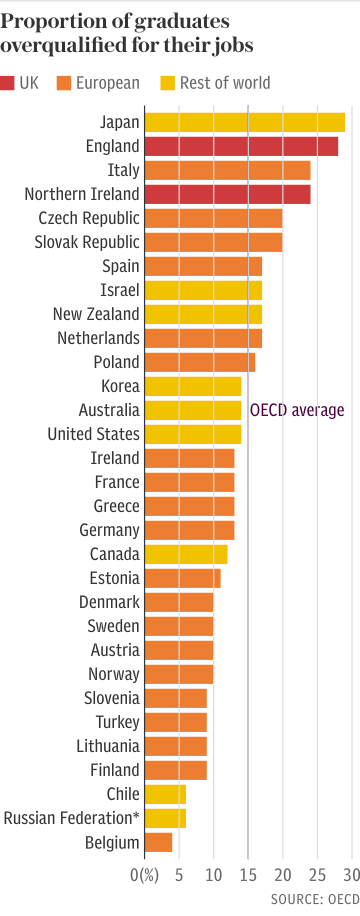The ‘Mickey Mouse’ degrees and universities that could reduce your earning potential

It used to be that a university degree was a fast track to a good career. But recently, graduates are increasingly finding themselves struggling to find work to match their qualifications and saddled with huge debts.
As Britain enters what looks set to be one of the toughest jobs markets in a generation, choice of degree is more important than ever. Research shows that, rather than boosting your salary prospects, graduating in some subjects actually leaves you earning less on average than someone who never attended university.
So which degree and universities should you avoid if you want to make your way into the ranks of Britain’s highest earners? And does it ever pay to do a PhD?
The Office for National Statistics (ONS) reported this year that almost one in three graduates is overqualified for their job. Some are even taking their universities to court for failing to provide value for money and receiving thousands of pounds in settlements.
New analysis of data from the Institute for Fiscal Studies (IFS) by Telegraph Money and wealth manager Hargreaves Lansdown has revealed the courses and institutions that can leave graduates in a worse position than if they had no degree at all.
The worst value degrees for men
There are a number of degrees that leave male graduates earning less than the average person who did not go to university. Looking at school leavers from the mid-to-late-Noughties, the IFS found that the average man who does not attend higher education but has five GCSEs from A* to C earns around £30,000 a year by age 29. Those with less than five GCSEs at A* to C earn roughly £23,000.
By contrast, the average male graduate who has paid thousands of pounds in tuition fees to study the creative arts, social care or communications will find themselves earning less than £30,000 a year. A creative arts degree leads to the lowest average salary by 29 (£25,900). Also featuring in the five worst degrees for male graduate pay are English and education.

Earnings are affected by factors other than just university education.
Sarah Coles of Hargreaves Lansdown explained: “The IFS study found that a typical student in higher education is more likely to be from a wealthier family, so they would be expected to earn more even if they did not go to university.”
When taking background into account men studying English or philosophy also earn less than the average man who left school after GCSEs.
The worst value degrees for women
The earnings of women who did not attend university are much lower: £21,000 a year on average for those with five GCSEs from A* to C and and £15,000 for those without. In almost all cases, a woman who obtained a degree of any kind will earn more than a woman who did not attend university.
Even those studying social care – the degree that leaves women with the lowest average earnings by 29 – enjoy a higher salary post-graduation (£22,300) than women who did not attend higher education.
Women who study creative arts, agriculture, education and sociology, also have low salaries with graduates earning from £24,000 a year with a creative arts degree to £27,000 a year with a sociology degree. Taking into account the background of the female students, the degrees that offer women the least value for money are creative arts, agriculture, social care, psychology and veterinary science.
Which universities offer the worst employment prospects?
Aside from type of degree, the choice of university can also have a surprisingly powerful impact on a graduate’s earning potential. There are 48 institutions in Britain where male graduates generally find themselves earning less than if they’d left school with five GCSEs from A* to C. For women, there are just two: the University of Bolton and the Conservatoire for Dance and Drama.
Bolton ranked at the bottom in terms of providing value for money for both male and female students. The average male graduate from Bolton University will be earning just under £22,000 by age 29 (£18,500 for female graduates), which is less than the average earnings of someone with no degree and fewer than 5 A*-C GCSEs at the same age.
Also numbering among the universities that leave male graduates earning less than non-graduates are Leeds City, Liverpool Hope, Bath Spa, Middlesex, Manchester Metropolitan, Coventry and Goldsmiths.
The best value degrees for men are provided by LSE and Oxford University, both of which boost earnings of male graduates by over 100pc compared to a person who did not attend higher education. For women, the top universities are Imperial and LSE, which increase earning potential compared to a non-higher education attendee by around 150pc and 190pc respectively.
Want to earn more money? You're better off with a second class degree
Surprisingly, even after a person makes the choice to go to university, studying hard does not always pay off. The IFS’s data showed that the graduates earning the most by age 29 were not those who achieved the best results.
The highest average salaries are enjoyed by those who graduated with a 2:2 (£35,000 a year). The next best earners are those with a 2:1 or a Third who earn on average £33,500.
Students graduating with first-class honours earn an average of £32,000 a year by age 29.

Is doing a degree still worth it?
The IFS’s research does conclude that completing a degree is still worthwhile. By age 29 the average man who attended higher education enjoys a salary 25pc higher than the average man who did not. For women the improvement on earnings is more than 50pc.
The research also found that the salaries of men who attended higher education continue to grow faster than non-graduates so that by the later stages of their careers their pay is much higher.
“If a higher salary is your key reason for going to university, you need to choose your subjects carefully,” said Ms Coles. “For women, studying medicine or economics increases your earning potential by more than 60pc and for men it increases it over 20pc.”
However a high salary post-graduation is not the only motivating factor for young people choosing to continue their studies.
“There are plenty of artists and philosophers who were enormously enriched by their university experiences – just not financially,” Ms Coles added.

Does doing a postgraduate degree pay off?
A report by the Department of Education has shown that the lowest-paying postgraduate degrees are those in humanities and liberal arts. A look at British postgraduate incomes five years after graduating shows that the median earnings for these subjects were £20,000 a year.
Female graduates with a postgraduate degree in creative arts and design earn on average £20,400, while male graduates enjoy slightly higher salaries of £23,500.
The best value postgraduate degree is a Master’s in Business Administration, which secures the average postgraduate a salary of £57,800 per year five years after their graduation. ONS figures show that the average annual salary in Britain in 2016 was £28,000.
Should degrees that reduce your earning potential be scrapped? Let us know in the comments section below.

 Yahoo Finance
Yahoo Finance 